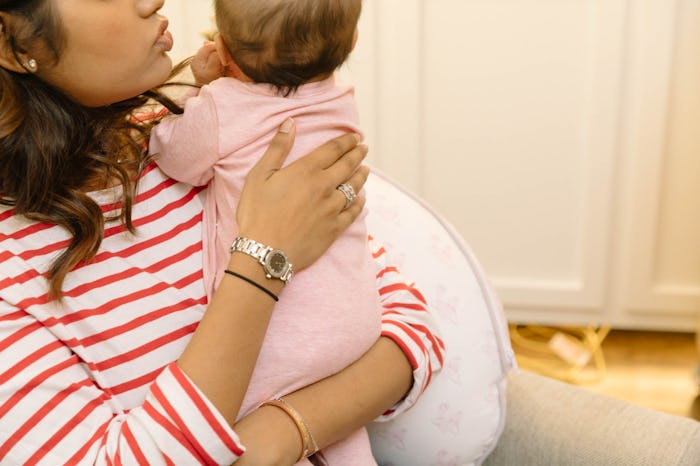Life
Actually, Your Baby's Got Some Scientific Reasons As To Why They Pull Your Hair
My son loved my hair. As a baby, he'd spend hours twining it around his little fingers, watching it collect and fall from his juicy little fist. He'd grab for a yank every time he'd nurse. It actually got to the point where I'd have to keep it down while I nursed him or he'd get really upset and cry for the lack of its comfort. This was all fine until he got a little older, a little rougher, and it hurt. I often wondered, as many of you probably have, why does my baby pull my hair? Is it just for fun, or does it have a deeper purpose?
There are many theories floating out there as to why babies do this, but still, nothing is concrete. One popular theory is that during the course of infant tactile development, they're not just appreciating a new sensation and texture that they're able to feel and understand, they're also seeking its purpose, according to Advances in Child Development and Behavior. By touching it, twisting it, and yes, pulling it, they examine how it works, and what other systems may be attached to it. It's a specific analysis of the cause and effect pattern that is maintained throughout childhood.
Everything is new to babies. Think of how they put everything in their mouths. They're developing proper responses to new sensory input every single day. When it comes to hair, it's all this cool stuff attached to their favorite people. It's fascinating to their senses, but it also reminds them of you. It's a type of early discriminative and affective touch. This type of touch, as outlined by Neuron, is touch that "subserves the perception of pressure, vibration, slip, and texture, all critical in providing haptic information about handled objects and during exploratory procedures." That is, they're learning about you and about touch through these gestures.
I spoke with certified lactation consultant and obstetric nurse, Joanie Gonzalez of Staten Island, New York, and she tells Romper that once babies can reach, they'll reach for anything. "Your hair is vulnerable because it's there. They probably love the feel and texture of it, and maybe even respond to your reactions if they pull it. If it's hurting you, if they're really pulling the heck out of it and not just learning, stop nursing or put them down and tell them 'no.' Even young babies will respond to a cessation of a nursing pattern and the word 'no' if used in conjunction with one another."
Gonzalez notes that if they're just twining and playing with it, it's likely acting as a security blanket or meditative practice for them. "You've probably played with your own hair while contemplating something. You've probably twirled it around your finger, or scratched your scalp while reading the paper." It's the same for them. They view it as a soothing apparatus.
Why does your baby like to pull your hair when you're not breastfeeding? Gonzalez posits it's still some tactile input they're looking for, or possibly they're searching out a cause and effect pattern that might arrive with the pulling. For instance, if they pull your hair, what will you do? Will it fall out? Will you put them down again? The thoughts might not be so well formed — they're babies after all — but the general concept remains. Babies learn what objects are and how they exist in their environment by touching them and interacting inside of that particular set of modalities. Everything is new, so it must be inspected throughly, and if they've found they enjoy the feedback from an action, they'll continue with that action until it's no longer pleasurable to them, which is probably long after it's no longer pleasurable to you.
Check out Romper's new video series, Bearing The Motherload, where disagreeing parents from different sides of an issue sit down with a mediator and talk about how to support (and not judge) each other’s parenting perspectives. New episodes air Mondays on Facebook.
